These Full Medical Checkups in Türkiye Would’ve Cost $30,000 in the U.S.
Read more



Editor’s Note: This article is based on personal experience, independent research, and firsthand observations. Some experiences or products featured may be gifted or discounted for the purpose of review, but we select providers and experiences independently. We are not medical professionals, and nothing shared here should be taken as medical advice. Some links in this article may be affiliate links, meaning we may earn a small commission if you choose to book or purchase through them. This comes at no extra cost to you and helps support our independent reporting.
I spent the last six months testing out a new kind of health membership that promises $15,000 worth of lab work for just $365 a year. No insurance or referrals required. It’s called Function Health, and honestly, I’m obsessed.
Function says they’ve cut out the middlemen like insurance companies, hospital billing departments, and unnecessary markups. What you get in return is access. Real, preventative healthcare access that most Americans simply don’t have.
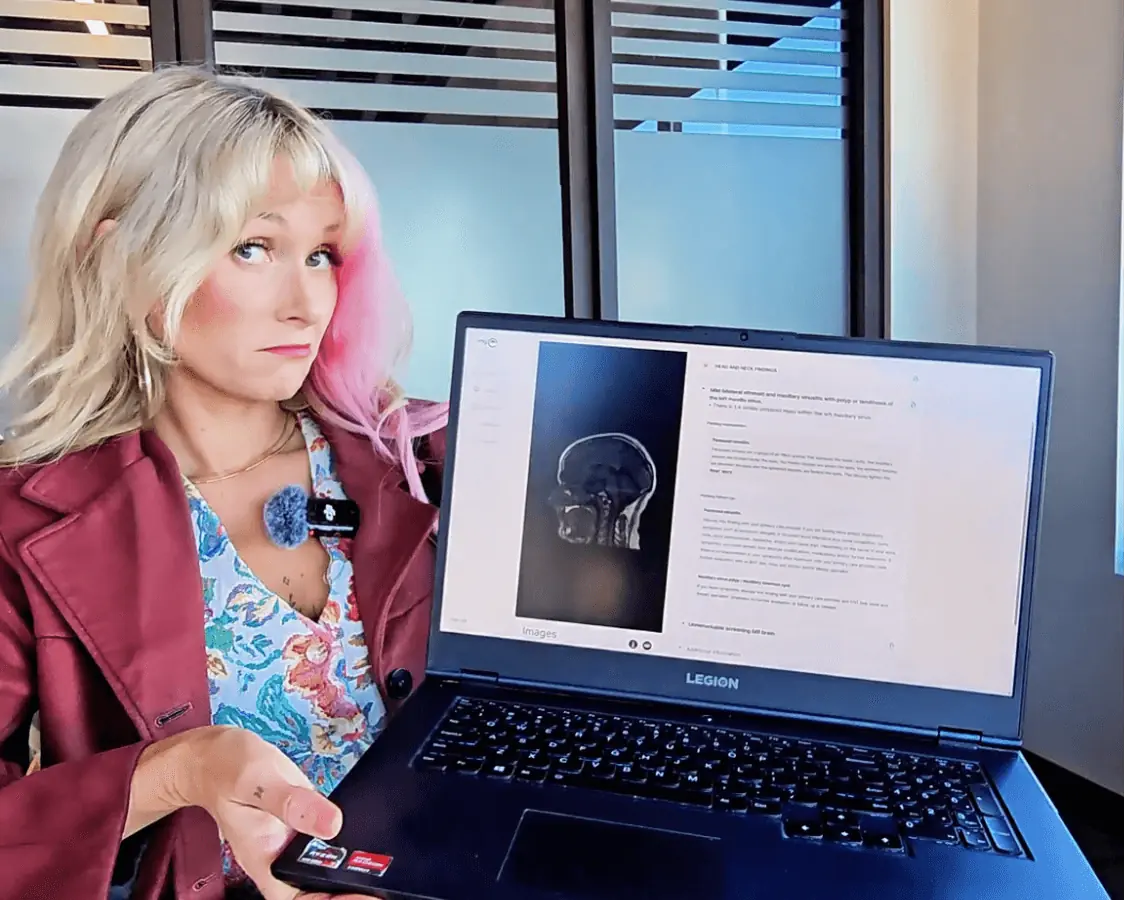
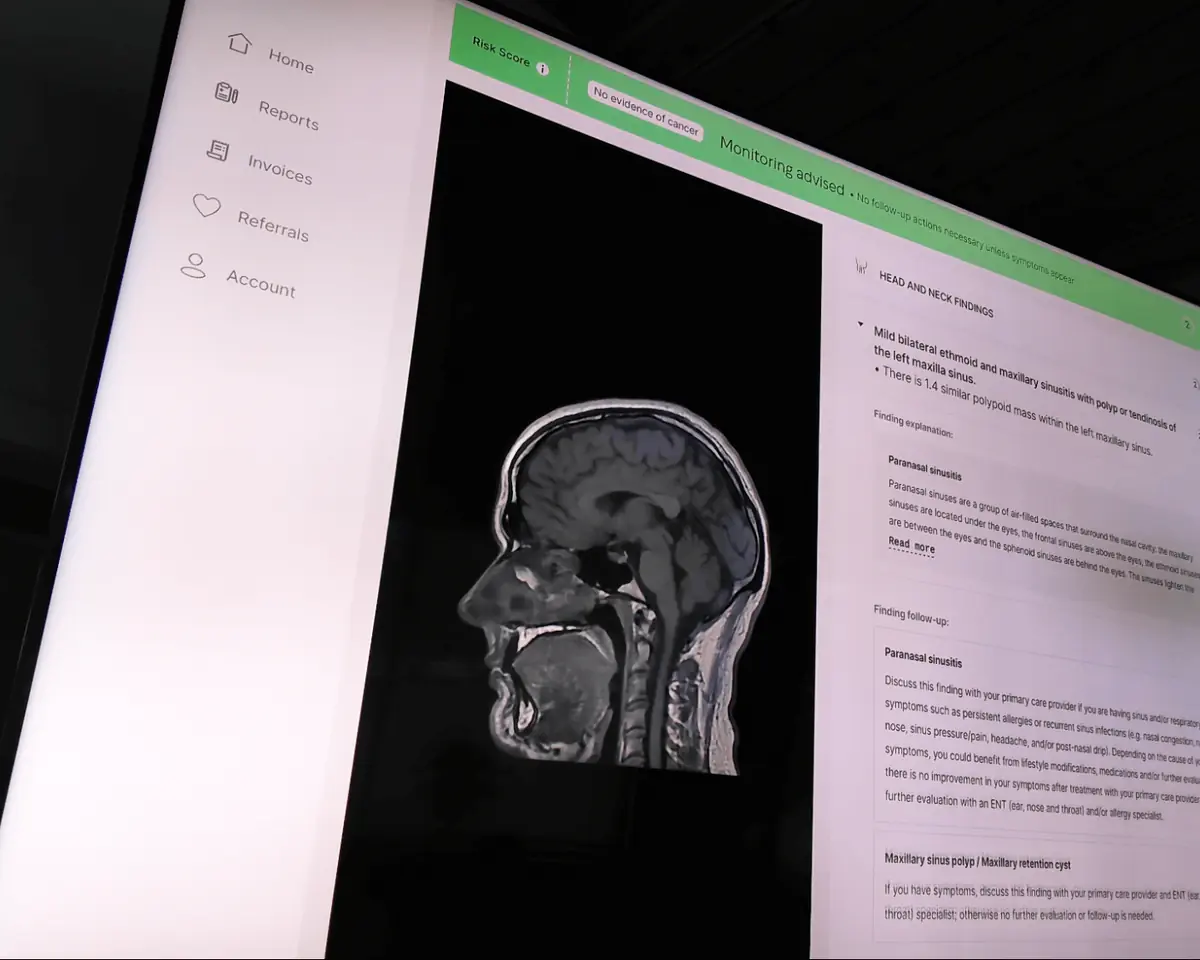
If you’ve followed me for a while, you know I’m always on the lookout for high-value treatments and checkups that make sense financially. This one blew me away.
We’ll get into everything that’s included below, but the biggest news is that Function recently added an AI-powered full-body MRI that scans for over 500 conditions. It’s available to members starting at just $499.
That means for $864 total, we did 160 advanced lab tests and a cutting-edge, 22-minute full-body MRI. In a country where even a single scan can run thousands, this just became my favorite checkup in America.
*To access the $499 AI-powered MRI, you’ll need to have the $365 Function Health lab test membership first. But if you’re not planning to visit a scan location, you can stick with just the 160+ lab tests. The MRI add-on is completely optional, and you don’t have to book it when you sign up. You can always add it later if you change your mind.
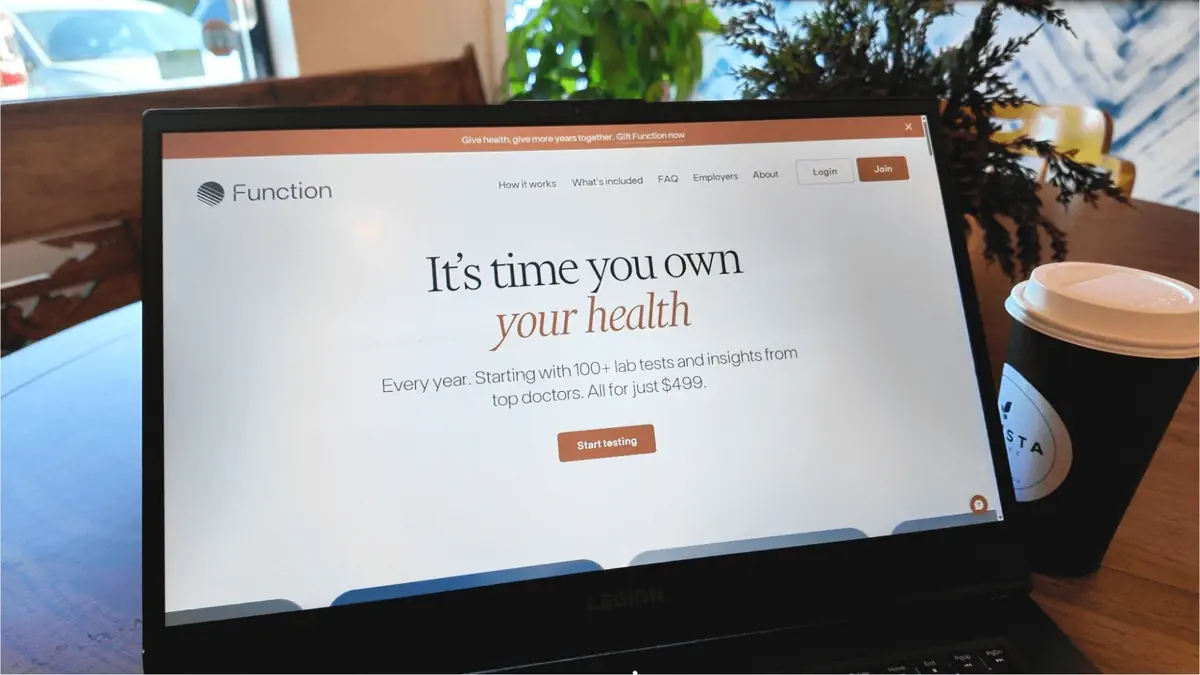
Function Health is a U.S.-based company founded by Dr. Mark Hyman, and they’re on a mission to make advanced testing more affordable and accessible.
Their goal is to give people the tools to take control of their health, without needing insurance approval or begging a doctor to run tests. Most annual physicals, if they include blood work at all, only test around 19 biomarkers.
Function’s team of licensed clinicians from various specialties came together to create a science-backed yearly membership that tracks over 100 biomarkers.
The goal is early detection, long-term health impact, and understanding the root causes behind what’s going on in your body.
Their website says each test in this membership was carefully selected to help detect early indicators of thousands of diseases, giving you a real opportunity to take action before something becomes serious.
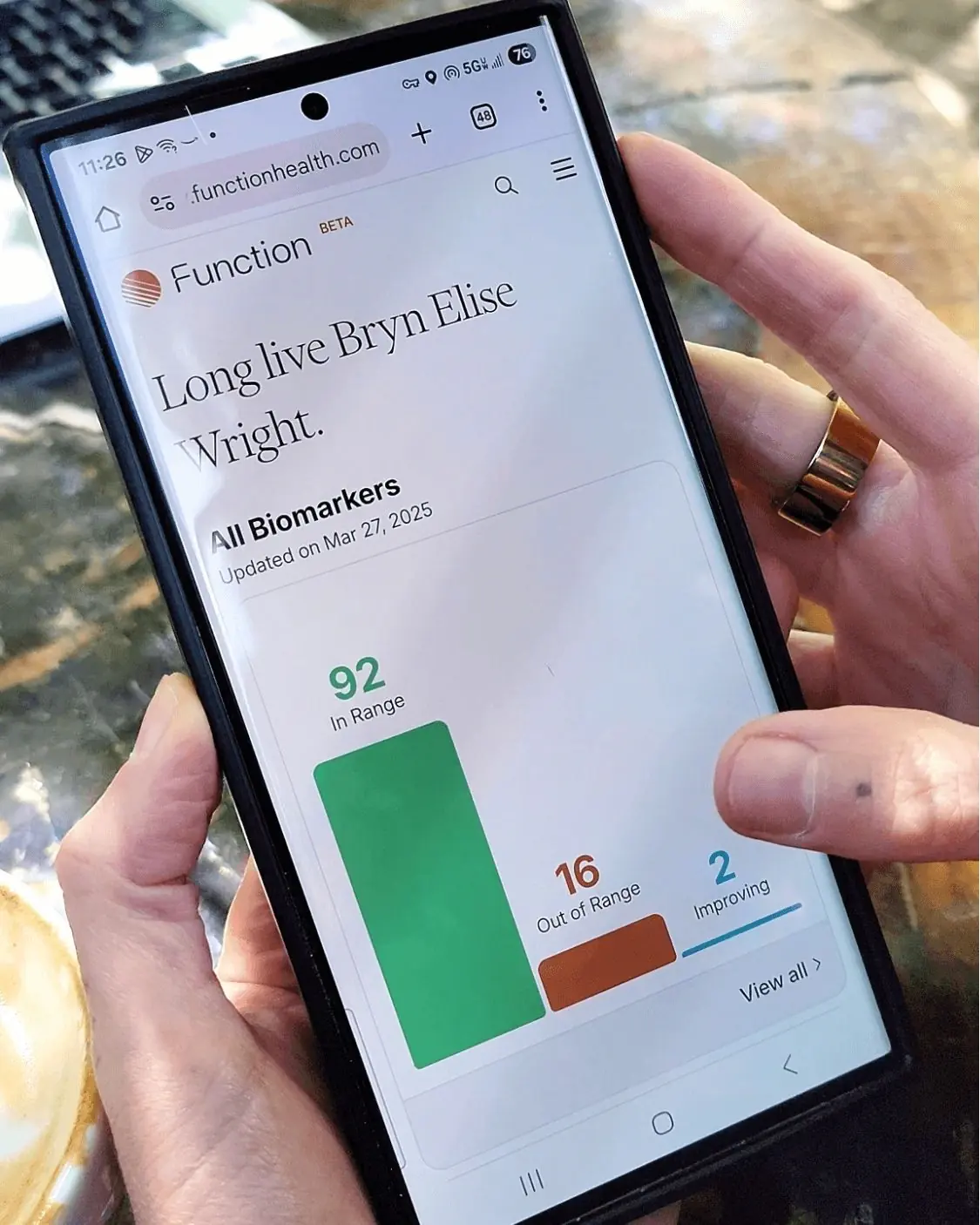

Your $365 Function Health membership starts with over 100 lab tests, which you can schedule at any of their 2,000+ partner locations across the United States.
To make testing accessible and affordable, instead of building their own facilities, Function teamed up with Quest Diagnostics to facilitate the lab appointments for them.
This is so exciting because it keeps costs low and allows you to get your lab tests done in 48 of 50 States. You can book your lab appointments directly through your Function Health dashboard, choosing a date and location that works for you.
Because there are so many Quest Diagnostics locations to choose from, we were able to book our appointments and get in that same week.
Before your appointment, you’ll receive a few prep instructions:
Your first round of labs happens over two short appointments within the same week. Each one takes around 15 minutes and involves 10 to 12 vials of blood, plus a urine sample. (Don’t forget to drink water beforehand, I always forget.)
I’ve gone to Quest Diagnostics for blood draws a dozen times, and they’ve always been quick, professional, and painless.
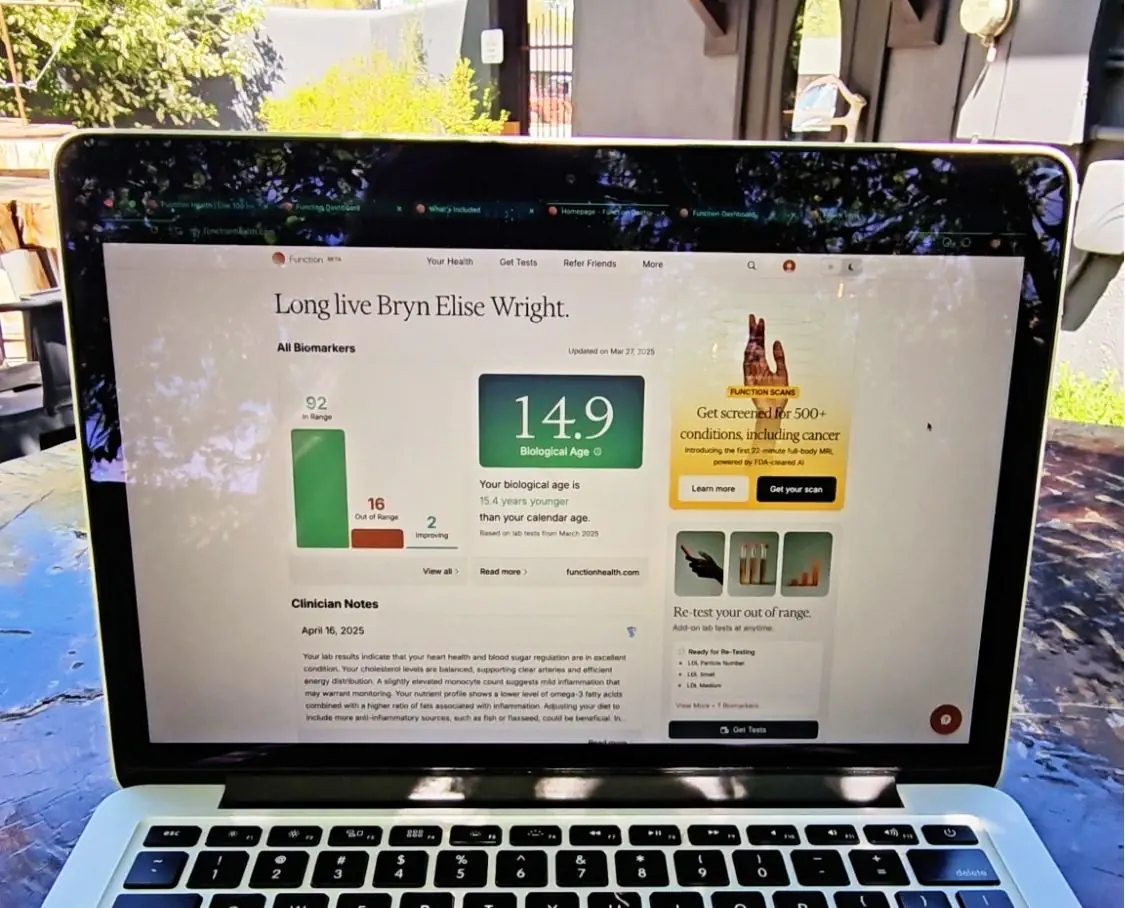
Once your samples are processed, your results begin appearing in your Function dashboard over the following weeks. I loved checking in every day to see which new biomarkers were ready and learning about each result.
For each of the 100+ biomarkers, you’ll see:
One of the dashboard highlights is an estimate of your biological age, which reflects how fast your body is aging on a cellular level compared to your actual age.
This matters because accelerated biological aging is linked to higher risks of chronic diseases like diabetes, heart disease, cancer, and cognitive decline.
Function calculates this number by using a method based on the DNAm PhenoAge model by Dr. Morgan Levine, which estimates biological age using standard blood biomarkers such as glucose, albumin, creatinine, C-reactive protein, and blood cell indicators.
While this method provides a useful estimate, it’s not as precise as DNA methylation testing. Function acknowledges this and says they continue to follow the research as it evolves.
Once your results are fully uploaded, a clinician from Function’s team will review them and leave detailed written notes inside your dashboard. If any critical results show up, they’ll give you a call.
I found the notes to be very thorough. The results were organized by category, like autoimmunity, blood, electrolytes, heart, immune regulation, kidney, liver, metabolic, nutrients, and urine.
Each section came with a summary and clear suggestions for improvement. There’s also a final recap outlining which results need attention and what steps to take.
Inside the dashboard, there is a section called 'Your Action Plan', which gives you personalized food and supplement recommendations based on your results.
For me, my “top 5 foods” are avocado, cranberry, hazelnut, walnut, and almond to support my cholesterol-related markers like LDL Small, HDL Large, and LDL Pattern.
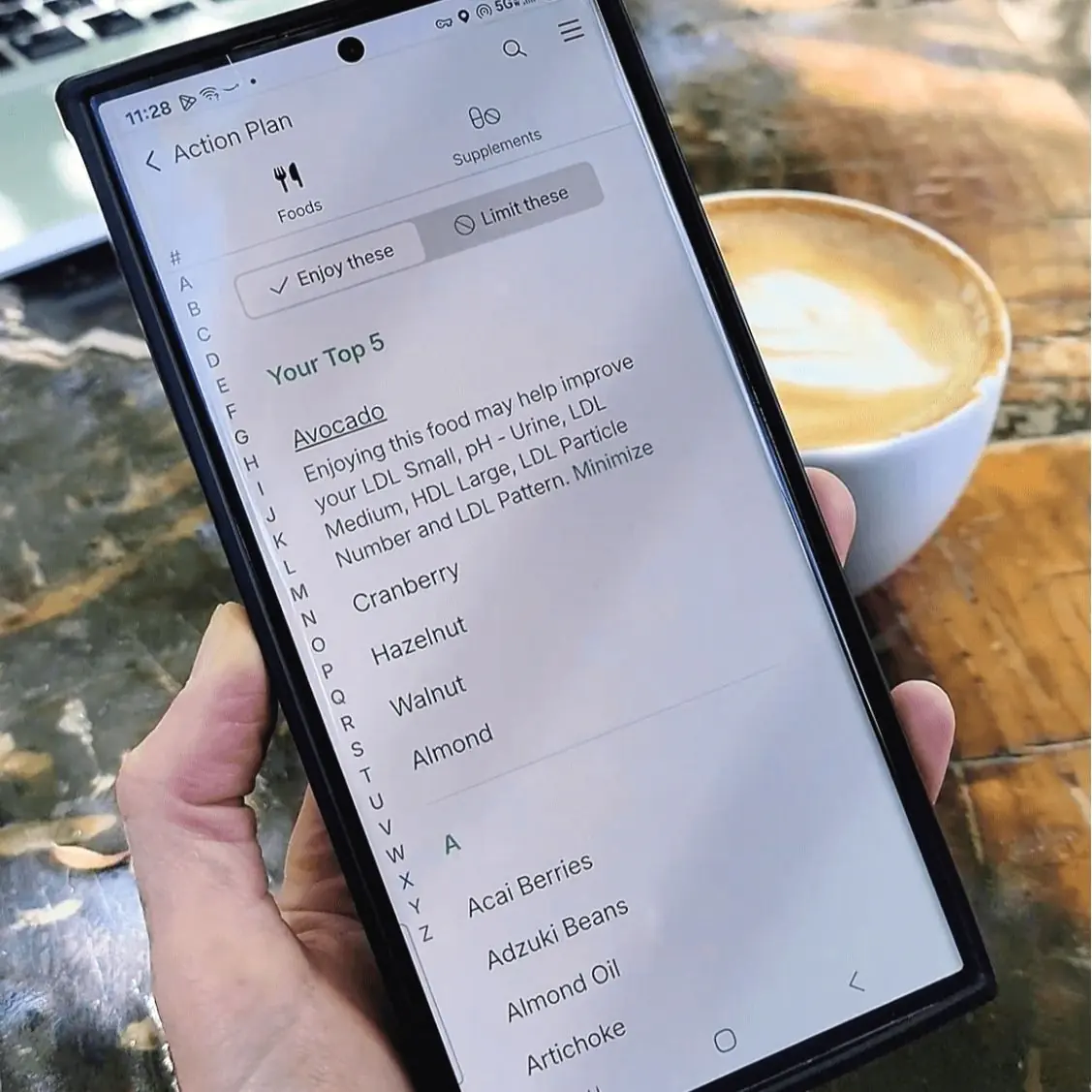
Three to six months later, your membership includes a second round of testing, this time covering 60 biomarkers. You’ll only need one appointment this time (not two), and it’s included in the same $365 annual membership.
Once those results come in, you’ll get another round of clinician notes, and your dashboard will show a timeline for each biomarker so you can track what improved, declined, or stayed the same. In my case, I was glad to see that two of my biomarkers that were previously out of range had improved, and my biological age also went down.
Even without any extras, I think this membership already offers incredible value. Especially in the United States, where most health testing feels overpriced or out of reach.
But what makes Function Health stand out even more is that once you're a member, you unlock access to a full list of affordable testing add-ons you can purchase at any time during your membership year.
Here are just a few of the add-on tests I saw available inside my dashboard, along with their prices:
As someone used to the limitations of the American healthcare system, this level of access feels almost unheard of.
Instead of pushing your doctor to figure out what’s wrong or waiting for insurance to approve every single test, Function lets you see all the options and choose what’s relevant to you. And the pricing is competitive too, especially when you compare it to traditional healthcare costs.
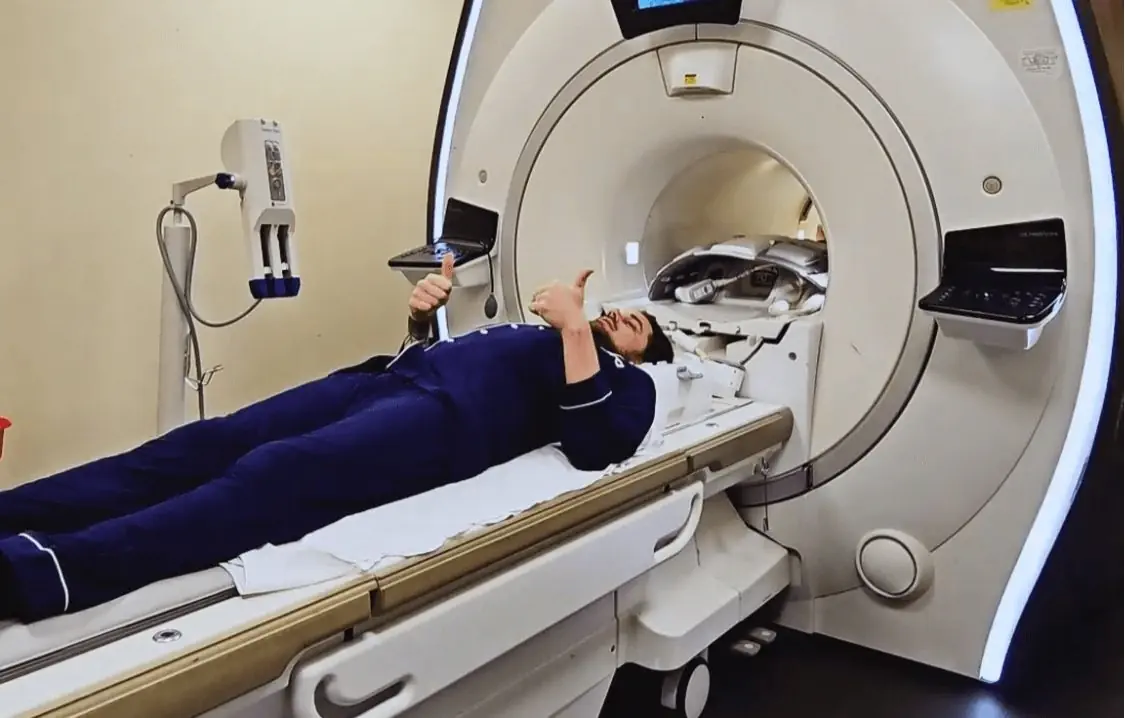
One of the most impressive additions to Function’s offerings is its new lineup of AI-powered MRIs.
These scans now range from a 22-minute MRI for $499 that screens for over 500 conditions, up to the Full Body MRI Ultimate, which includes two 60-minute scans plus a CT scan for $3,999.
Here are all of their MRI options, and why this is so exciting:
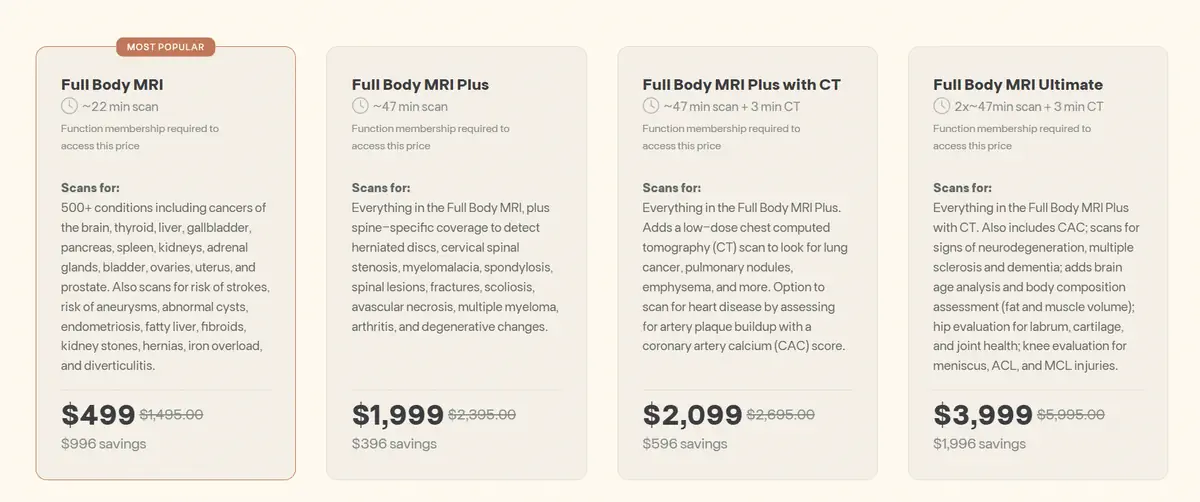
Function Health has just acquired the AI-powered MRI company Ezra, and Function came in they slashed prices. Before the acquisition, Ezra’s 22-minute scan cost $1,500. With a Function Health membership, that same scan is now just $499.
That means you can get both the 160 lab tests and a 22-minute MRI for a total of $864. When you compare that to other full-body scan providers like Prenuvo, Function’s pricing comes in significantly lower, and it includes far more value thanks to the extensive blood work.
I am very curious to see how other companies in the space respond to this price drop.
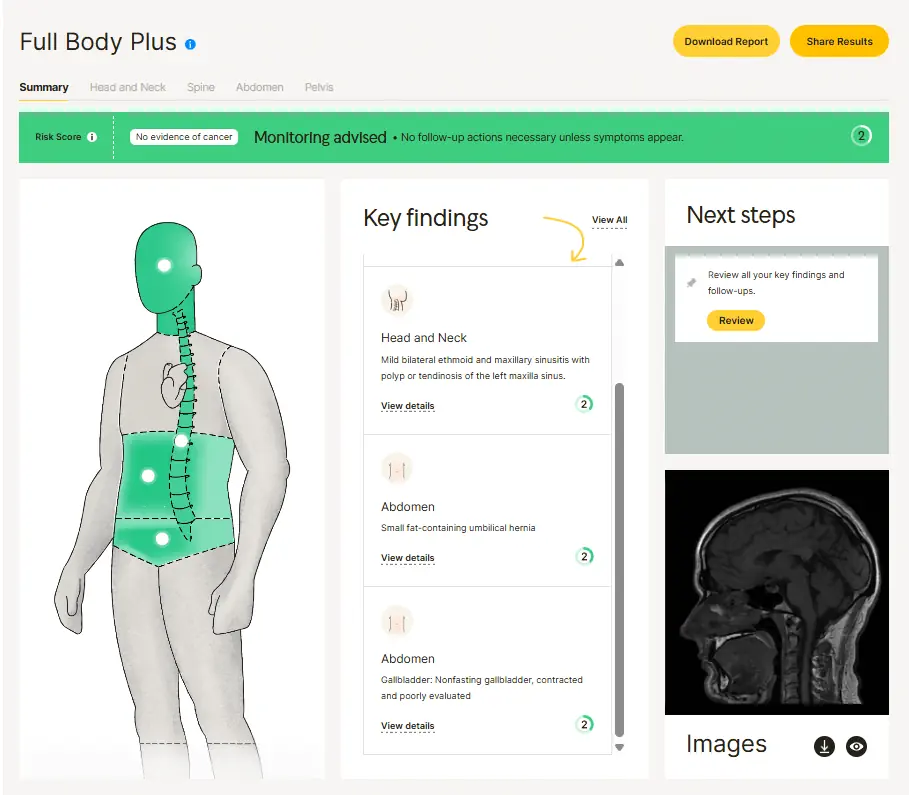
Ezra, now part of Function Health, is a full-body MRI screening service that uses FDA-cleared AI to offer faster scans. According to their website, Ezra has helped 6% of their members detect potential cancer early.
MRIs do not use radiation. However, if you choose a package that includes a CT scan, that portion does involve radiation, so it’s something to be aware of when selecting your option.
Fun fact, we had actually been trying Function Health and Ezra separately. We started filming our Function Health experience about six months ago, and then last month, we flew to California to try an Ezra scan.
At the time, we had no idea the two companies were about to merge or that pricing would drop right as we wrapped up filming, so this feels serendipitous.
We’d selected both companies on our own because we were impressed by what they offered. Now that they’ve joined forces, I truly think this might be the best health deal in America.
Back when we booked, we opted for their Full Body MRI Plus scan. That scan now costs $1,999 through Function Health or $2,395 on Ezra’s site.
This was before the $499 option existed, so if I had the choice today, I would’ve started with the more affordable 22-minute scan and possibly upgraded to something more comprehensive next year.
If you’re unsure which scan is the right fit for your situation, Function has a helpful section in their FAQs that breaks it down.
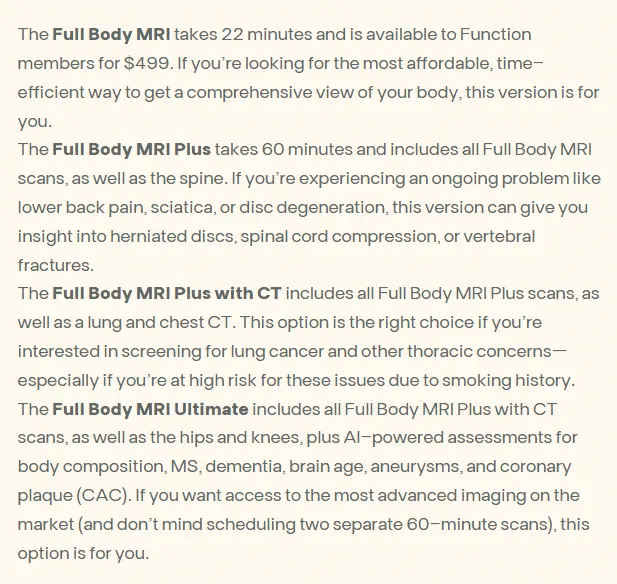
To access the discounted Ezra pricing, you need to book through your Function Health dashboard. It will redirect you to the Ezra website, where you can choose a location and schedule your scan.
From what I saw when scheduling our scan, appointments typically book about three to five weeks in advance, depending on availability. However, Ezra seems to be adding new locations quickly, which should help improve access over time.
To get started, you’ll fill out a health questionnaire on Ezra’s site and watch a short video that explains how the scan works. The questionnaire will walk you through a few key health and safety checks to make sure you're eligible. For example, it asks about any metal in your body that could interfere with the scan.
This was actually the reason Cody ended up doing the MRI for our video instead of me. I had metal pieces in my hair extensions, so I’ll need to wait until I get them removed before I can schedule mine.
Ezra, like Function, partners with existing facilities to perform their services. Instead of building scanning centers from scratch, they work with established imaging clinics to handle the MRIs. This is part of why they’ve been able to grow quickly. It also means your scan will be conducted by experienced healthcare professionals using professional-grade equipment.
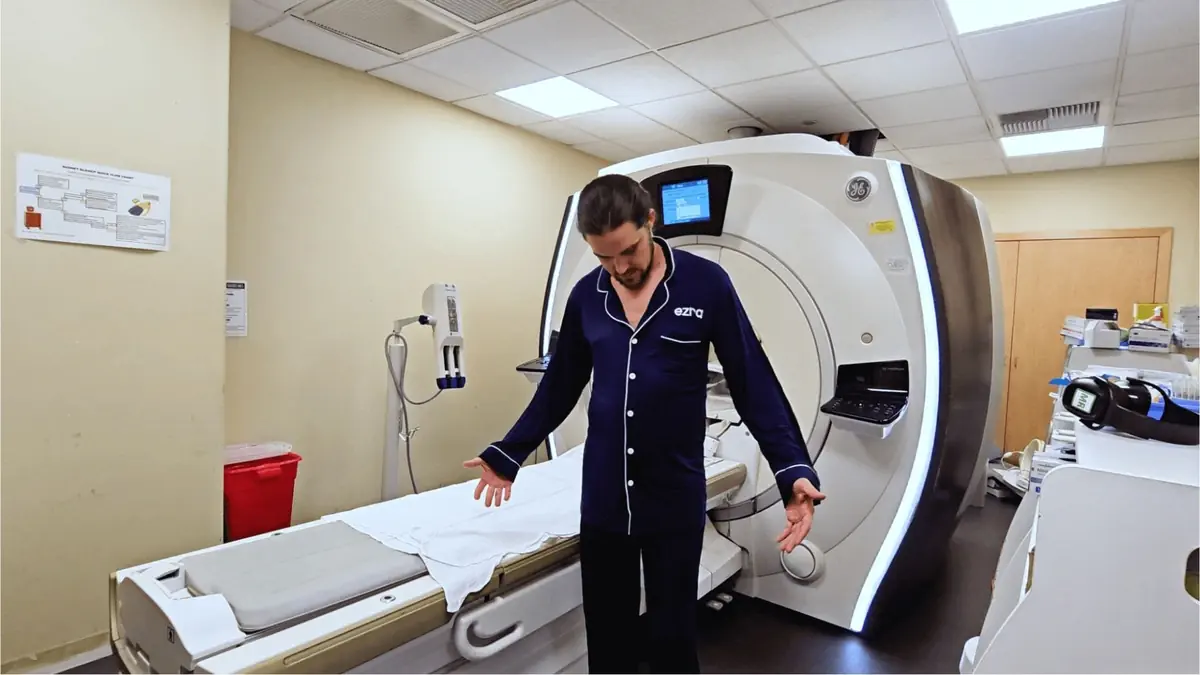
When we arrived, Cody was given a pair of Ezra-branded pajamas to change into. Yes, you get to keep them, and they’re really soft. Then it was time for the scan.
The only real caveat of using partner facilities is that the actual scan experience isn’t very curated. Ezra is aware of this, which is why they provide videos ahead of time to explain what to expect. Honestly, I cared more about this when the scans were priced at $1,500+. Now that they’re $499, I couldn’t care less if the room has mood lighting or not.
That said, the facility we went to was undergoing some construction and didn’t have the newest machines. Other Ezra partner locations do have fancier setups with music and lighting, so if that matters to you, I recommend looking up each location in your area and choosing one that looks like the best fit.
For people who are sensitive to confined spaces or get claustrophobic in an MRI machine, the environment can make a difference. If I were opting for the Full Body Ultimate package, which includes two 60-minute MRIs and a CT scan, I’d absolutely try to book at a location with more comfortable amenities.
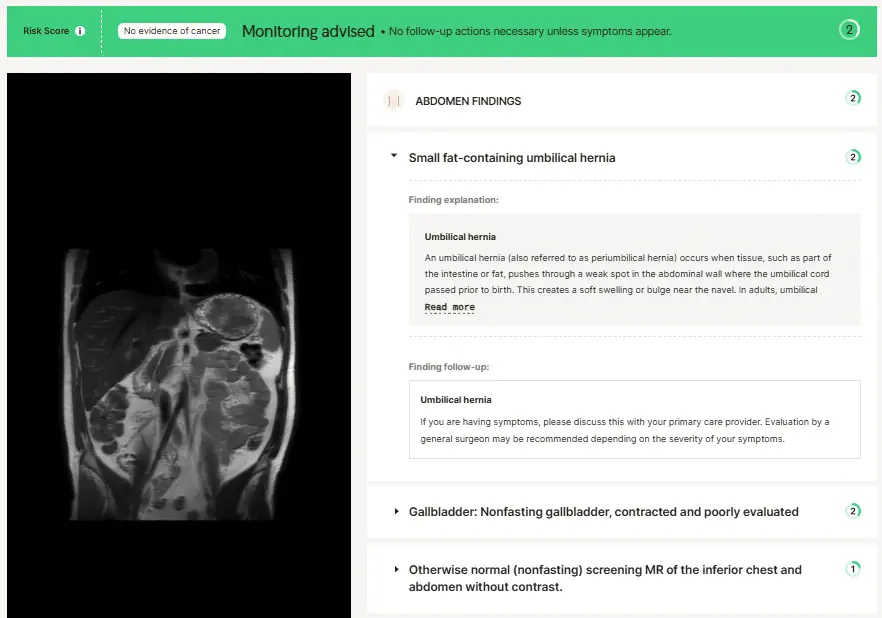
After your scan, your results will be processed and uploaded to your Ezra dashboard, usually within about a week. The dashboard assigns a risk score from 1 to 5 to each part of the body that was scanned. A score of 1 means findings don’t suggest any issues. A score of 5 means go to the ER immediately.
Cody received 2s across the board. That means there were some findings worth monitoring, but no evidence of cancer, and no follow-up needed unless symptoms appear.
Ezra also provides a list of key findings, which includes more details about anything unusual that was observed.
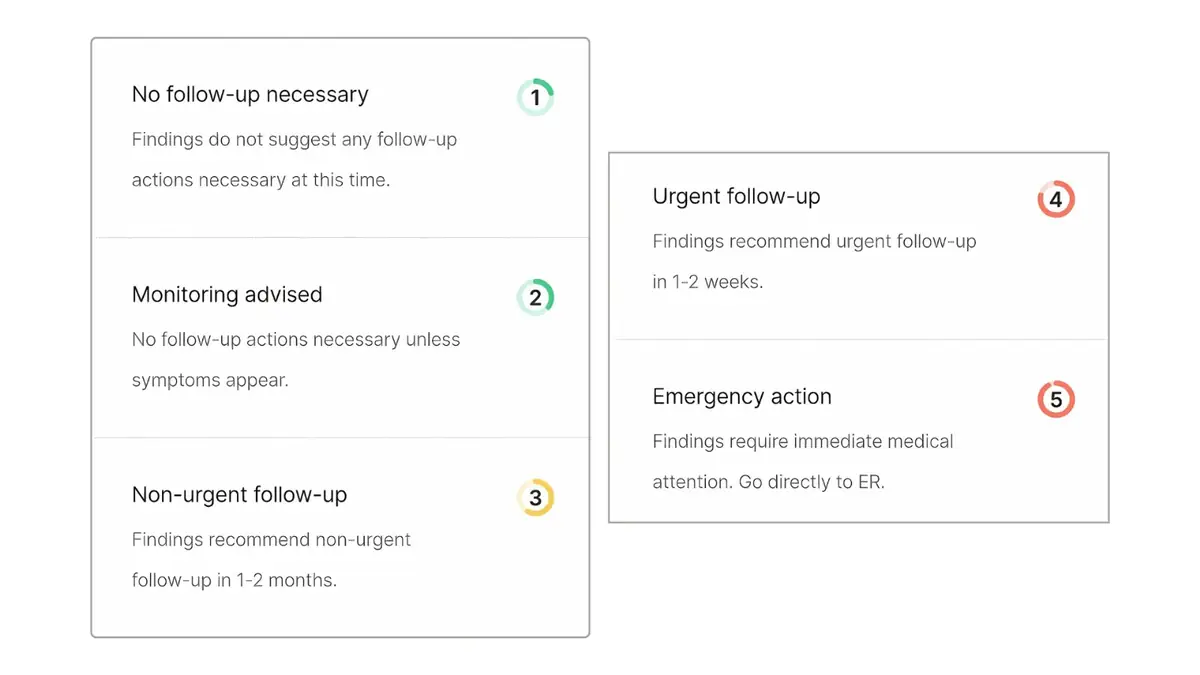
Each finding includes a full page of information explaining what was found, why it matters, and what it could mean. You can also view images from your scan directly in the dashboard.
We would absolutely do this again, and we feel grateful that everything looks okay. This is one of those things where, if nothing comes back, people will say it was a waste of money. But if something serious is caught early, people call you a genius. The truth is, you never know until you do it.
Cody lost his brother to cancer at the age of 26, so getting scanned has been something he’s wanted to do for a long time. We’re glad he did.
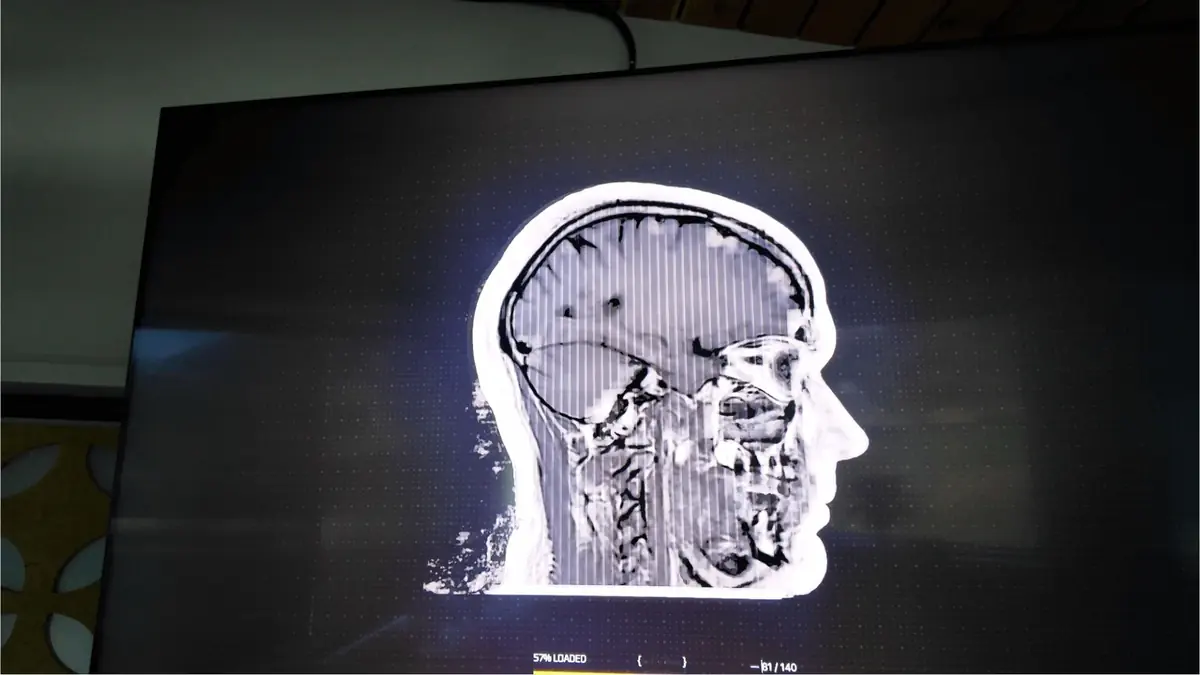
Here are a few things that are helpful to know when considering a Function Health membership and scan:
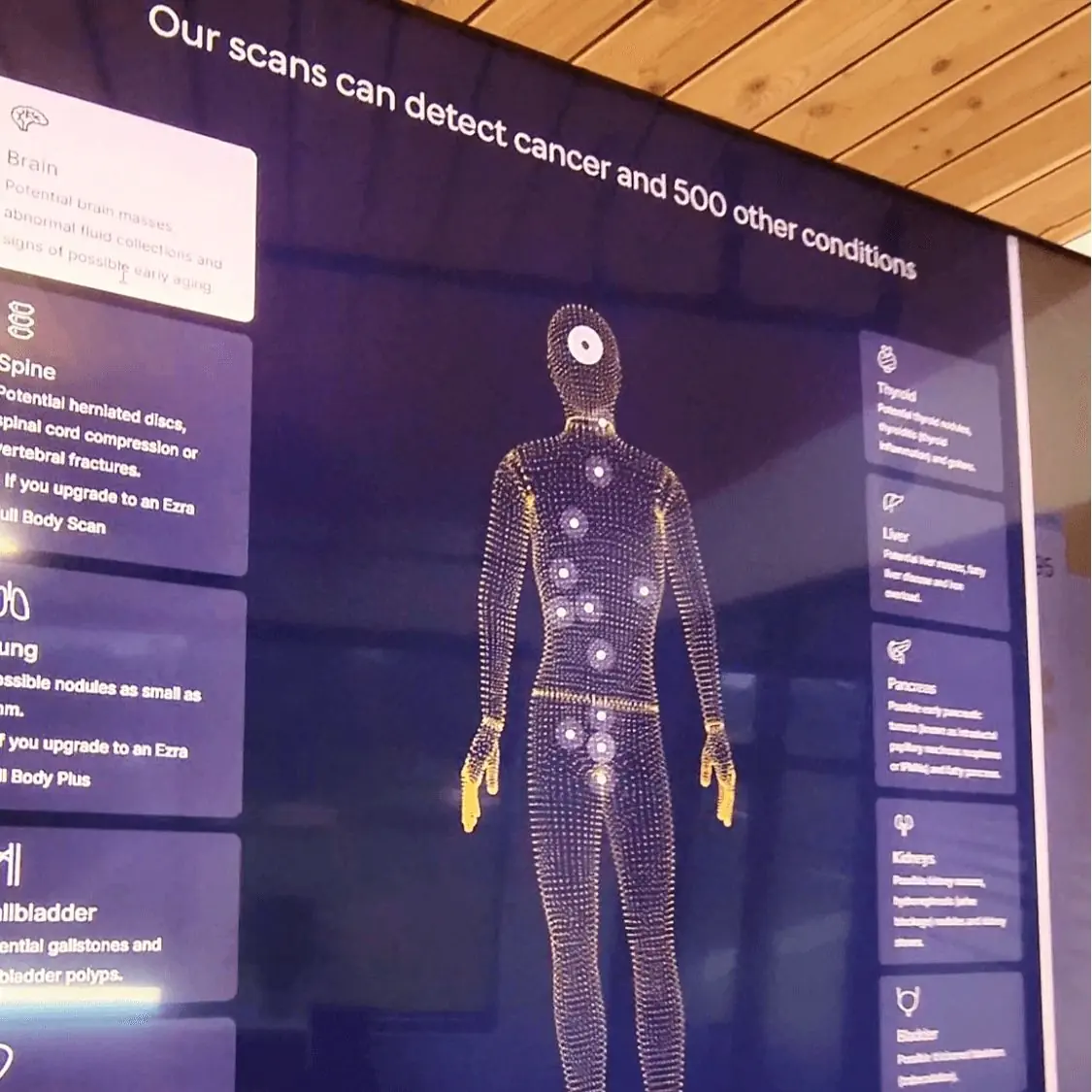

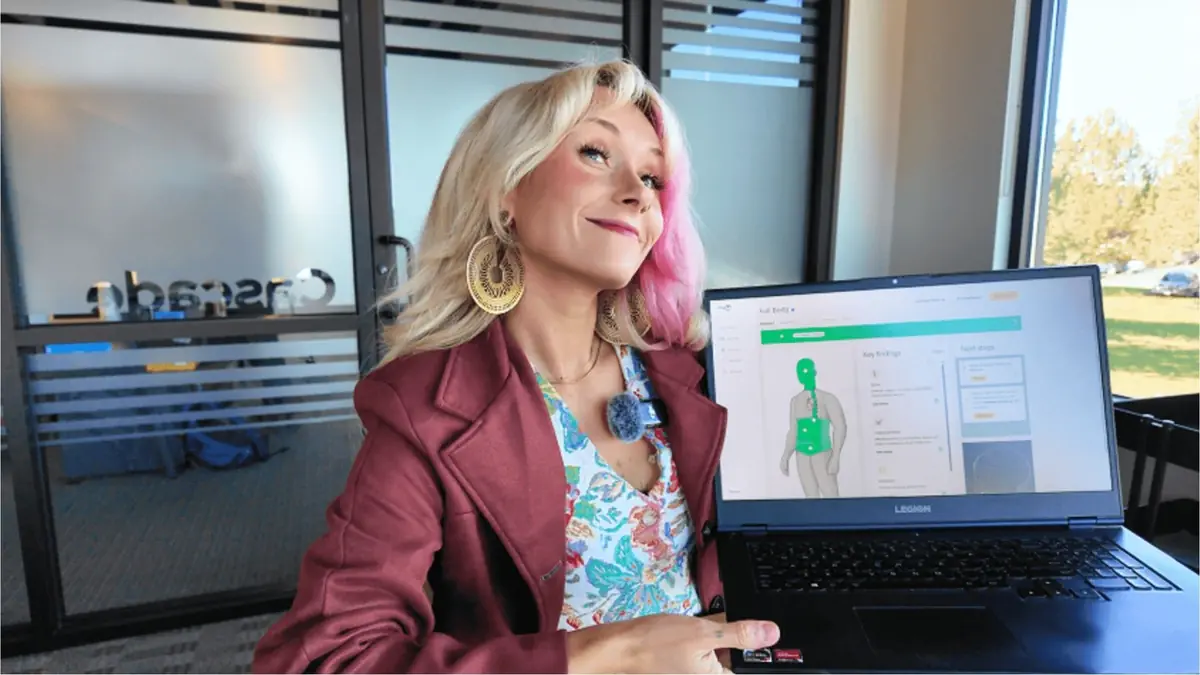
Trying both Function Health and Ezra over the past few months has completely changed the way I think about health screenings in the U.S. For under $1,000, we were able to complete over 160 lab tests and a full-body MRI, without needing referrals or dealing with insurance.
What stands out most to me is how committed Function seems to be to keeping costs low.
In a system where everything feels marked up and inaccessible, it's refreshing to see a company actively working to make proactive care more affordable and transparent. If this model continues to grow, I could genuinely see it shifting the way people in America approach their health. It removes so many of the usual roadblocks and gives people more control, earlier insights, and better tools to stay well before there’s ever a problem.
It’s not perfect. There are wait times, and I’d still love to see more options for follow-up calls. But what you get for the price is rare, and it’s a huge leap in the right direction. Now I’d just like to see insurance start covering this, or employers including this in their benefits package.
If you’ve been wanting to take a deeper look at your health without spending thousands or fighting through the traditional system, this is one of the most accessible ways I’ve found to do it.
Disclosure: This article is based on personal experience, independent research, and firsthand observations. We are not medical professionals, and this content is not intended to provide medical advice, diagnose conditions, or recommend specific treatments. Every person’s health situation is different, and outcomes can vary. If you are considering any medical or cosmetic procedure, whether at home or abroad, please consult with a licensed healthcare provider or specialist to determine what is appropriate for your individual needs. All information shared here is intended for general informational purposes only.